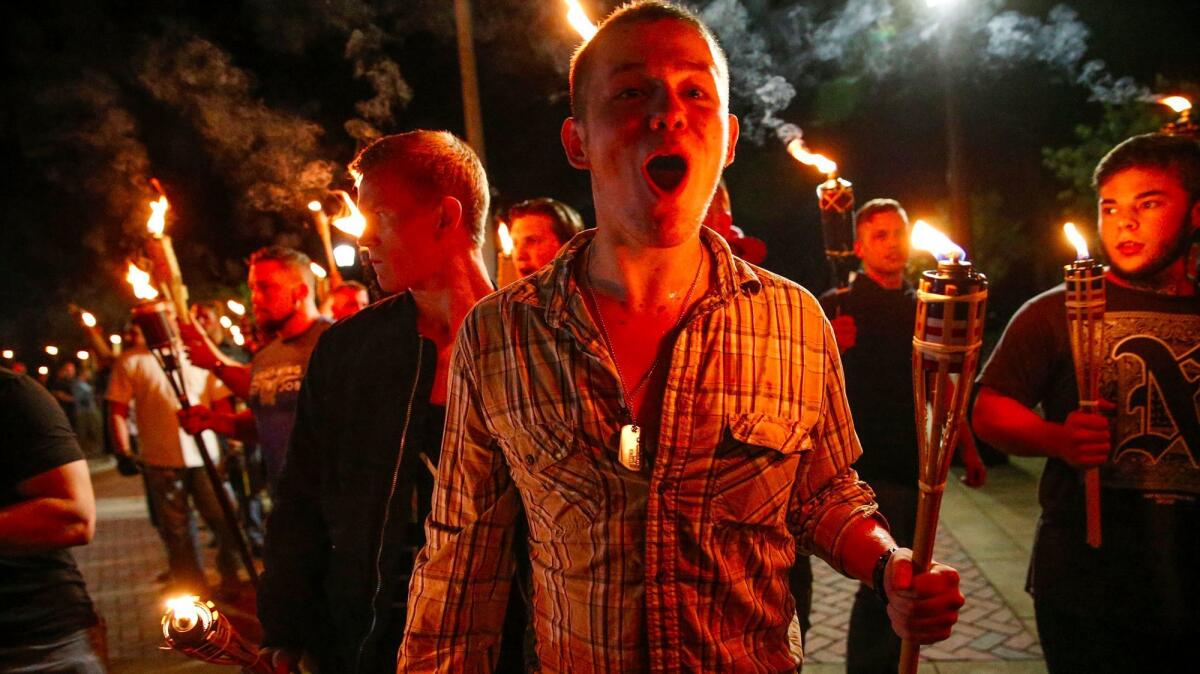Editorial: Trump bears some responsibility for the racism on display in Charlottesville

The violence in Charlottesville, Va., on Saturday at the “Unite the Right” protest against the proposed removal of a statue of Confederate Gen. Robert E. Lee was irrefutably rooted in racism, and bore disgusting echoes of Nazism. For evidence, look no further than the Hitlerian “blood and soil” and “Jews won’t replace us” chants during a pre-protest rally Friday night by a Tiki torch-bearing parade of overwhelmingly white men.
And to erase further doubt, former Ku Klux Klan leader David Duke watched the violence unfold Saturday and declared that the white supremacy movement — which is what he represents — was at “a turning point.” Added Duke, “We are going to fulfill the promises of Donald Trump. That’s what we believed in. That’s why we voted for Donald Trump, because he said he’s going to take our country back.”
Some might quibble with that analysis, but they do so either as apologists for hatred, or as naifs. Because the violence in Charlottesville clearly was the product of the rise of racism as a political force in this country. And we can only hope that Charlottesville was the culmination of that rise and not, as Duke seems to hope, the first flames of a wildfire.
So how did we get here? It’s easy to blame the hatred and divisiveness that spilled out of the Trump campaign. But truth be told, he tapped into a current of American political and social beliefs that has been around for generations. The detestable views on display in Charlottesville reflect the worst of America — a nation that rose on the backs of slaves, that banned the Chinese from entering, that in some places restricted the sales of homes to white people. Yes, we as a nation are more than that. But we are also that.
Trump, to his detriment, has emboldened this rise. He missed a sterling opportunity to strike a different, more presidential, note Saturday with a milquetoast condemnation that failed to call out the racism that propelled Friday’s march and Saturday’s violence. We are a nation increasingly divided politically, economically and ethnically, divisions he has exploited and thus helped exacerbate. The weekend’s skirmishes and utterances ring of 1930s Berlin — though the nation is far from descending into fascism — and the 1950s desegregation battles across the South. They also mark a failure of political discourse and the political system, which is supposed to mediate our political differences, not accentuate them.
That young angry white men would march with torches and chant Nazi slogans is chilling, jarring and indefensible. Some have sought to equate that display with the leftist protesters who engaged in running street brawls with the white nationalists, but that is to grossly confuse messages, and motives. When the nationalists took to the streets, they did so as an act of hatred and of history. They should not have been confronted with violence — peaceful expressions of repugnant views must be tolerated lest we became a nation of mobs and thugs. But those who give vent to the darkest corners of the human heart are uniquely vile.
We as a nation are at a dangerous place in our politics. With institutions questioned, delegitimized and, in the case of the federal government, eroded from within, we must recognize that the strength of a democratic society rests in its ability to forge common ground, to have common faith in each other and to isolate those who would seek to shred the national fabric. Given the gaspingly inadequate response by Trump, we must look elsewhere for leadership that can help navigate such rocky waters.
But most of all, we must look within.
Follow the Opinion section on Twitter @latimesopinion or Facebook
More to Read
A cure for the common opinion
Get thought-provoking perspectives with our weekly newsletter.
You may occasionally receive promotional content from the Los Angeles Times.










